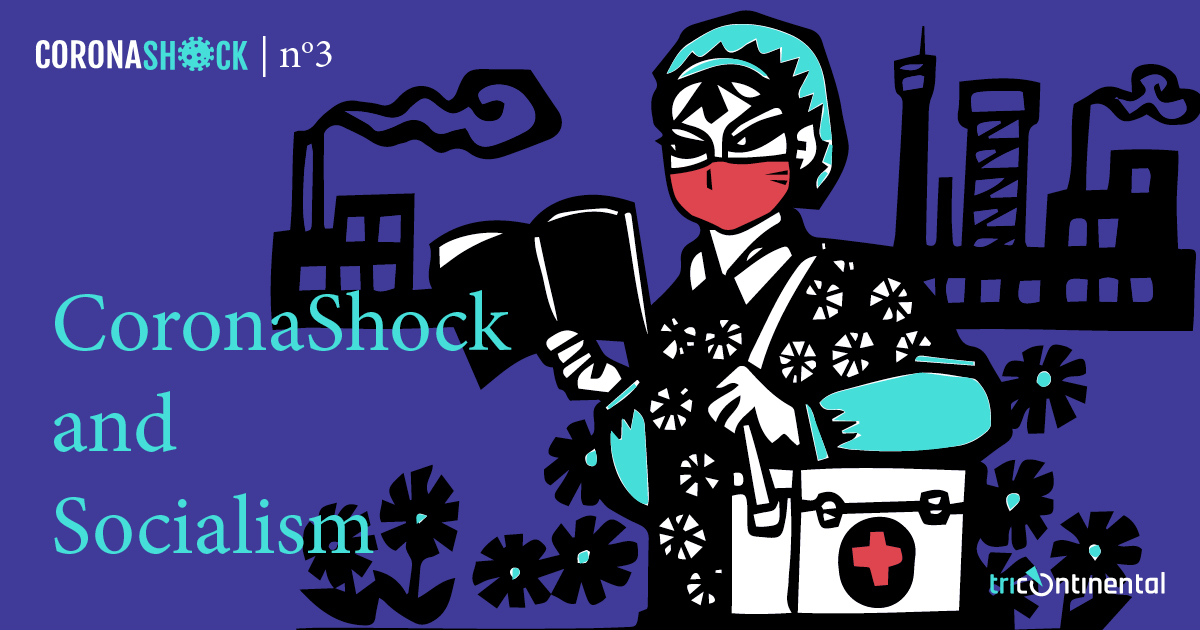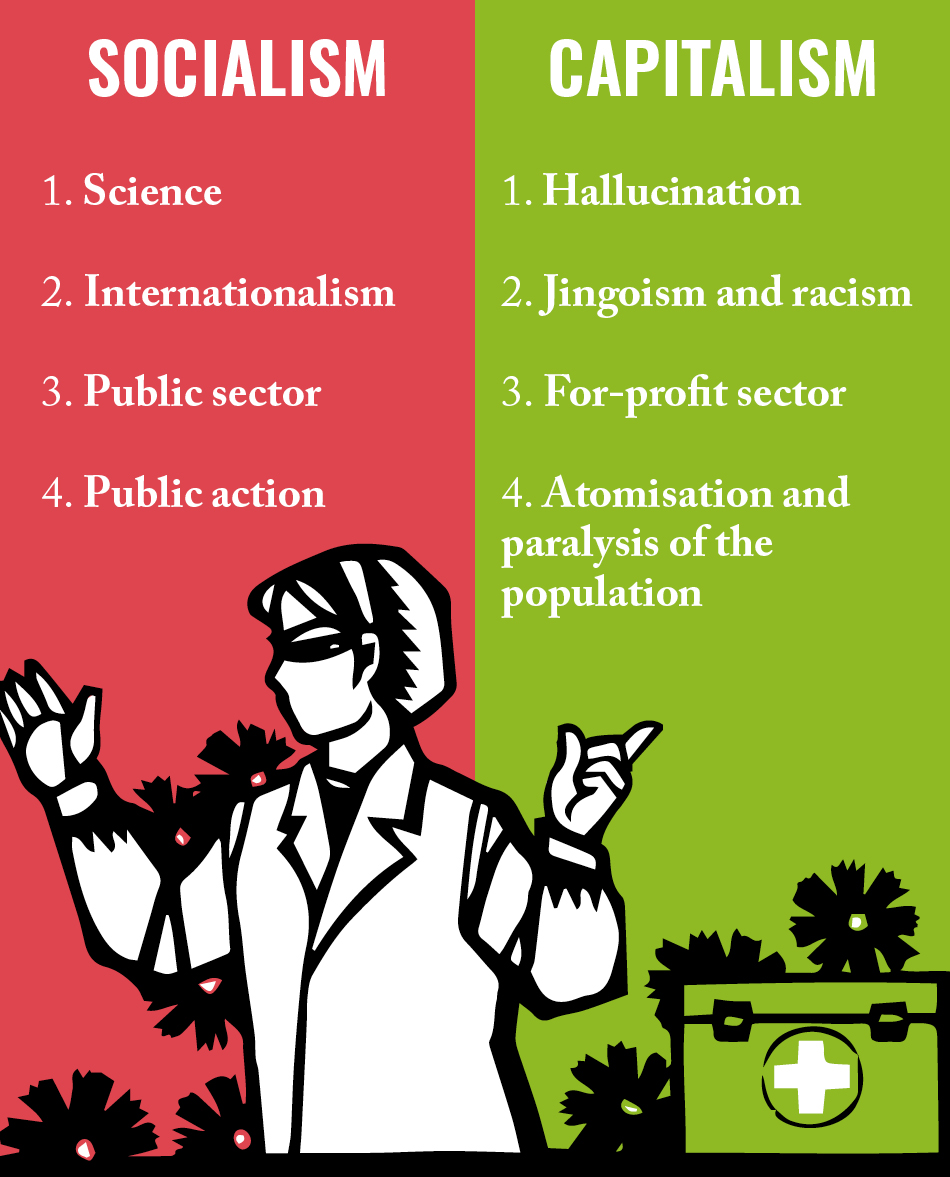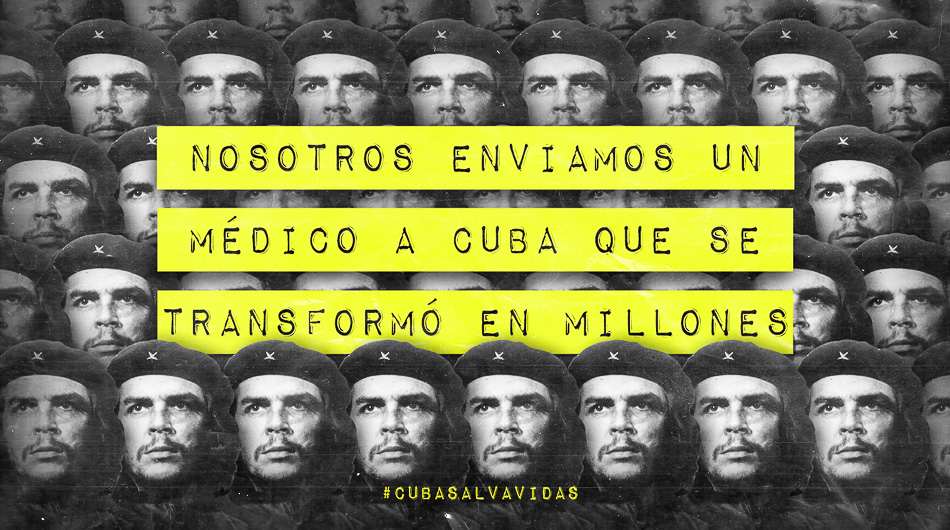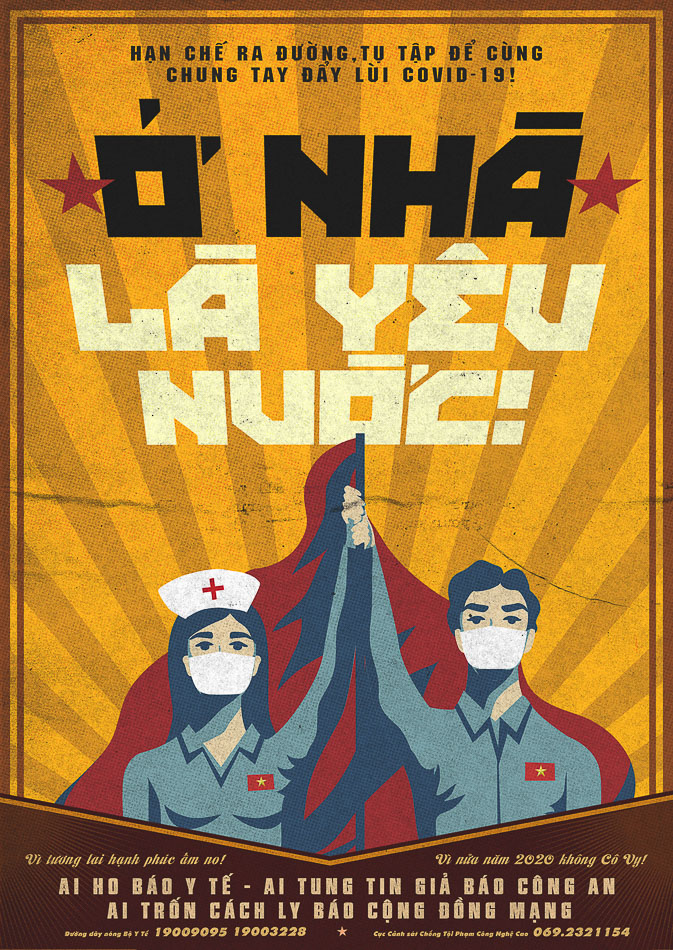Vijay Prashad explores the differences between the pandemic responses of a few countries with socialist governments and others in the capitalist order.
By Vijay Prashad
Tricontinental: Institute for Social Research
 Too little has been made of the fact that countries like Laos and Vietnam have been able to manage the coronavirus; there are no confirmed deaths from Covid-19 in either country. Both of these Southeast Asian states border China, where the virus was first detected in late December 2019, and both have thriving trade and tourist relations with China. India is separated from China by the high Himalaya Mountains, while Brazil and the United States have two oceans between themselves and Asia; nonetheless, it is the United States, Brazil, and India that have shocking numbers of infections and fatalities. What accounts for the ability of relatively poor countries like Laos and Vietnam to attempt to break the chain of this infection, while richer states – notably the United States of America – have floundered?
Too little has been made of the fact that countries like Laos and Vietnam have been able to manage the coronavirus; there are no confirmed deaths from Covid-19 in either country. Both of these Southeast Asian states border China, where the virus was first detected in late December 2019, and both have thriving trade and tourist relations with China. India is separated from China by the high Himalaya Mountains, while Brazil and the United States have two oceans between themselves and Asia; nonetheless, it is the United States, Brazil, and India that have shocking numbers of infections and fatalities. What accounts for the ability of relatively poor countries like Laos and Vietnam to attempt to break the chain of this infection, while richer states – notably the United States of America – have floundered?

Our team at Tricontinental: Institute for Social Research has been studying the way in which governments in places like Laos and Vietnam have tackled the rapid spread of the coronavirus to better answer this fraught question. We looked closely at the experiences of three countries (Cuba, Venezuela, and Vietnam) and one Indian state (Kerala); these investigations are now published as our third CoronaShock study, “CoronaShock and Socialism.” In this investigation, it became clear to us that there are four principal differences between the Covid-19 response of countries with a socialist government and countries in the capitalist order:

Science Versus Hallucination
The moment that the Chinese scientists and doctors announced that the coronavirus could be transmitted between human beings on Jan. 20, 2020, the socialist governments went into action to monitor ports of entry and to test and trace key parts of the population. They set up task forces and procedures to immediately make sure that the infection would not go out of control amongst their people. They did not wait till the World Health Organization (WHO) declared a global pandemic on March 11.
This is in stark contrast to governments in the United States, the United Kingdom, Brazil, India, and other capitalist states, where there has been a hallucinatory attitude towards the Chinese government and the WHO. There is no comparison between the stance of Vietnam’s Prime Minister Nguy?n Xuân Phúc and U.S. President Donald Trump: the former had a sober, science-based attitude, while the latter has consistently laughed off the coronavirus as a simple flu as recently as June 24.

Miguel Guerra (Utopix, Venezuela), A los médicos cubanos (“To the Cuban Doctors”), 2020.
Internationalism Versus Jingoism & Racism
Trump and Brazilian President Jair Bolsonaro seem to spend less time preparing to tackle the virus and more time blaming China for the virus, more concerned with deflecting their own incompetence than caring for their people. This was the reason that the WHO Director-General Dr. Tedros Adhanom Ghebreyesus called for “solidarity, not stigma.” Jingoism and racism could not save the United States or Brazil from the onrush of the pandemic; both countries quickly found themselves plunged into a severe crisis.
Meanwhile, it was Vietnam – a poor country that, within living memory, was bombed with weapons of mass destruction by the United States – that sent protective equipment to Washington, D.C., and it was Chinese and Cuban doctors who went around the world to offer their assistance in the fight against Covid-19. No medical teams from the United States, the United Kingdom, Brazil, or India could be seen anywhere. Marinating in racism, the dangerously incompetent leaders of these states tried to hypnotize their populations into carefreeness. The price being paid by the population is very high. That is the reason why the writer Arundhati Roy called for a tribunal to investigate the governments of Trump, Modi, and Bolsonaro for what amounts to a “crime against humanity.”

#CubaSalvaVidas Campaign, “We sent a doctor to Cuba; the doctor transformed into millions,” 2020.
Public Versus Profit Sectors
The term “flatten the curve” is a surrender to the reality in states that have privatized healthcare and shrunk their public health systems, which cannot handle a pandemic. As we showed in dossier no. 29 (June 2020), “Health Is a Political Choice,” the assault on public health systems led the WHO to warn about the dangers of the surge of any pandemic in countries that had accepted the neoliberal mandate to privatize healthcare delivery.
Countries like Vietnam and Cuba were able to rely upon their public health systems and their public sector to produce whatever was necessary to fight the virus – from protective equipment to pharmaceutical drugs. This is the reason why it was Vietnam – a poor country – that was able to send the United States – a rich country – half a million units of protective equipment.
Public Action Versus Paralysis & Atomization
Kerala, a state of 35 million, saw its many mass organizations of youth and women, workers and peasants, as well as its many cooperatives, directly enter the process of breaking the chain of infection and providing relief for the population. One cooperative, Kudumbashree – made up of 4.5 million women – produced masks and hand sanitizers at enormous volumes, while trade unions built sinks at bus stations. This type of public action was apparent across the socialist world, from Cuba’s Committees for the Defence of the Revolution, which mobilized to make masks and support health campaigns, to Venezuela’s community kitchens and Local Committees for Supply and Production (CLAP), which expanded food deliveries to ensure that people’s nutritional needs were met.
This level of public action is simply not available in the advanced capitalist countries, where mass organizations have been tethered and voluntary action has become professionalized in non-profit organizations. It is ironic that in these large democracies, the populations have been atomized and have come to rely upon state action, which remains decidedly absent.

Hiep Le Duc (Vietnam), (“To stay at home is to love your country!”), 2020.
It is for these reasons that Laos and Vietnam have had no deaths, and that Cuba and Kerala were able to hold down the rates of infection; if not for the people infected in Venezuela’s neighboring countries (Brazil and Colombia), mired in neoliberal policies, the numbers of those infected would be even lower, though the country’s current total of 89 deaths from Covid-19 pales next to Brazil’s 72,151, the U.S.’ 137,000, and Colombia’s 5,307. It is worth noting that, despite this vast discrepancy in numbers, Venezuela’s President Nicolás Maduro would still insist on the severity not only of the disease itself but of the value of each of the 89 lives lost.
But countries like Laos, Vietnam, Cuba, and Venezuela face severe challenges, even as they have largely been able to contain the virus. Cuba and Venezuela remain threatened by a callous sanctions program set in place by the United States; they cannot easily get access to medical supplies or easily pay for them.
A government official from Laos told me, “We defeated the virus crisis. Now we are going to be defeated by the debt crisis, which we did not create.” This year Laos will have to pay $900 million to service its external debt; its total foreign exchange holdings amount to under $1 billion. The coronavirus recession, absent the universal cancellation of debt, has produced a serious challenge to these socialist governments who have been able to valiantly manage the pandemic. A call for debt cancellation in this context is a matter of life and death. This is why it is a key part of the “Ten-Point Agenda for the Global South After COVID-19.”

For good reason, my mind wandered to poets and militants from an earlier era who fought to produce humanity in the world. Two Iranian poets came to mind, both killed in different ways by the dictatorship of the Shah: Forough Farrokhzad (1934-1967) and Khosrow Golsorkhi (1944-1974). Farrokhzad’s wonderful poem, “Someone Who Is Not Like Anyone,” urges the arrival of someone who will come and “distribute the bread,” “distribute the whooping-cough syrup,”, and “distribute the hospital admission numbers.” She died in a car accident; the circumstances mysterious.
Golsorkhi was accused of plotting to kill the Shah’s son. At his trial, he announced, “As a Marxist, my address is to the people and to history. The more you attack me, the further I am from you and the closer I am to the people. Even if you bury me – and you certainly will – people will make flags and songs from my corpse.” He left behind many cherished songs, including one which gives us the title of this newsletter and is an exhortation against the uncertainty of our times:
We must love one another!
We must roar like the Caspian
even if our cries are not heard
we must bring them together.
Each heartbeat must be our song
the redness of blood, our banner
our hearts, the banner and the song.
Vijay Prashad, an Indian historian, journalist and commentator, is the executive director of Tricontinental: Institute for Social Research and the chief editor of Left Word Books.
This article is from Tricontinental: Institute for Social Research.
The views expressed are solely those of the author and may or may not reflect those of Consortium News.
Please Contribute to Consortium
News on its 25th Anniversary
Donate securely with  PayPal here.
PayPal here.
Or securely by credit card or check by clicking the red button:


You certainly have a point that socialist countries are able to control their populations, and consequently induce them to perform great acts efficiently. However the consequent capacity for evil acts was not mentioned in this article, nor that, at this stage, it is too early to see what the overall results will be, in human and economic terms, for any country as a result of the present virus.
An interesting thing is that the author did not mention Cambodia, intimately bound geographically and politically to both Vietnam and Laos. With it’s rampantly capitalist system (albeit built on the disasters of its previous communist era, and before that, US imperialism) and primitive medical system, it boasts a Covid “score” of 171 cases and no deaths. Although these figures are admittedly rather unbelievable, the country seems to barely have a problem with the virus at this stage (although economically it is a different story, of course). And the author has not even brought into question the notorious dishonesty and corruption regarding self-reporting of negative statistics among socialist/communist nations.
We might also like to consider my little country down here – New Zealand. At last look we were pretty capitalist (although with some admirable social democracy, which puts the US to shame), and we presently seem to be the darling of the world due to our total eradication of the virus within the community (fingers crossed – early days yet).
Well said Daniel, thank you!
I get a bit tired of the rhetoric of communism,…goodddd, while wonderful, free market capitalism,… baddddd. Poppycock, and the idea that capitalism and racism go hand in hand, more poppycock. The most capitalist nations in the world [and the USA is not one,] have social safety nets, which is hardly socialism. What we have here in the USA is not capitalism, but rather a return to feudalism and monopolies for the elite, like as given under the King before our revolution. We have gone backwards since, and Europe, and your charming nation, have forged ahead.
The article is interesting and despite its pro-communist ideas, is still informative, I love the variety of writers on Consortium, you get a wide view reading them!
Thanks for the article. The United Statian army should feel ashamed after what it did to Vietnam. There are so many things that only the time tells.
Mortality rates per million inhabitants:
( worldometers as per 18/7)
500 or more: Italy, Spain, Belgium, Sweden,UK….
Around 400: France, USA, Brazil, Netherlands
Around 200: Canada, Switzerland, Luxembourg, Portugal
Around 100: Germany, Denmark, Russia, South-Africa
Under 20: India, Vietnam, China, Laos, the whole African continent, Greece
Where would you rather live ?
What do the low mortality countries have in common ?
Conclusion : these are countries where the authorities do not prohibit and even promote the use of certain generic drugs that save lives ?
India must break the capitalistic approach for covid19 treatment. Treat tbe patients with the lowest cost fof medicines both in private and public sector. Keep the lockdown in effect but start the works and transport for the people. Open tbe institutes but observe thesocial distancing strictly
I am Iranian. Yes to Forough Farrokhzad, my favorite poet. Love and Peace. No to Khosrow Golsorkhi, a heroic lunatic, or a lunatic who wanted to become a hero and succeeded to become one.
He left out the fact that those countries use quinine for Malaria prevention, have better diets, are more physically active and get a lot of Sunshine and Fresh Air.
There are something that should never be in private hands .Health care for one. This article is a testimony to my claim.I could point to much more but suffice it to say ,the article speaks for itself.
Thank you for presenting it to us.
China, Vietnam, Laos all share wlong social history of cooperating for the greater good. Thailand, too, which shares language abd culture with Laos, if not socialism.
Rob Roy, UBI will be a an inevitable necessity. Unfortunately, those in power in the U.S. wait until the last minute 0 and sometimes until it is too late. By 2050, it is anticipated that as much as 40% of the working public will lose their jobs to AI and machines. Those at the very top may not like it, but things will have to change, or those greedy, uncaring people will get to know what it means to fear for one’s life.
Dear Vijay Prashad and Joe Lauria, an excellent article.
Thank you for this moving and very educational piece. It is painful to see the stark difference between responses by the US to the virus crisis, and the much more humane responses of socialist countries.
The author fails to mention the largely capitalist countries (e.g. Germany) that have fared well in controlling the coronavirus. Also, countries that were initially inundated with cases and deaths (e.g. Italy and Spain) are now doing well overall. Of course, those countries have more vibrant public sectors and a sense of communal solidarity than do the U.S., Brazil and India, where the public sectors have been decimated and people are encouraged to be self-reliant.
Exactly…and how convenient not to mention Canada.
You missed some of the point. The author is comparing the responses of public health systems regardless of whether they are in a quasi socialist country or capitalist one with privatized healthcare in a capitalist system. Germany may well be a capitalist country but there healthcare system is public as is Italy’s and Spain’s. Regardless of how you describe it; self reliance, rugged individualism, the adage that, “No man is an island,” has been proven and the places where people aren’t uniting in a common cause are suffering.
Overstatement diminishes an interesting exposition.
Yes, Trump compared initially the virus to flue, as did many politicians in many countries. Even China initially tried to downplay it.
But since then he has–perhaps grudgingly–noted many times it is more serious than the flue.
What is clear is that money and power trump all other considerations. And despite gaps in social responsibility built into the systems of socialism and capitalism, both have a central motivating theme–that an assumed unlimited growth is possible and must be pursued.
Both will realize in this century that is not sustainable.
As a person who spent 30 years of life under the communist regime in eastern Europe, I am no more astonished how the hoax pandemic can be used to write imaginary articles.
Krzysztof Ho?ubicki,
You do realize that the Soviet Union no longer exists, don’t you? The USSR is gone.
BTW, if the pandemic is a hoax, why are there thousands dead from Covid19?
I strongly recommend Victor Grossman’s book “A Socialist Defector- from Harvard to Karl-Marx-Allee”. He was an American soldier in the Korean War who voluntarily moved into East Germany in 1952 when the US Army threatened to imprison him for not being anti-communist enough, and he lived in East Germany for the next 38 years and is still there in the united Germany. His life there is meticulously described and the difference between the health, education, housing, jobs, solidarity and other aspects of life compared with the West, where money and luxury have more value, allow a different POV from the usual denigration of anything “socialist”.
@Rob Roy
I do realize that Soviet Union just changed its shape and borders and that’s why we constantly hear about thousands dead from Covid19.
Amen! This is true! There are so many contradictory statements and with a little research away from propaganda sites you can see how it has been played on the people that are too lazy to seek the truth. Just let them feed you what you are supposed to think. Well, I had it… it’s like rapid bronchitis but they gave me syrup medication sent me home 5 days later I am fine. The hospitals are Not packed i don’t know anyone’s with it but Texas is on. Code Red. Locking us down again. Ridiculous! The rules of this game are changing every day Yes the numbers are exaggerated and the severeity is no more than influenza. Propaganda scares and fear allows control.
It’s a bit of a stretch to turn the epidemic results into confirmation of ideologies. None of SE Asia, including very capitalist Japan, Singapore, Taiwan, S Korea and Hong Kong, has had much of a problem with covid-19. The reason is simple; they all ignored the WHO and followed their own Public Health protocols. When the WHO said it would be “counterproductive” to institute travel bans, all of SE Asia did just that; their standard procedure. Not only did they outright ban people from infected areas, they monitored health of arrivals from other places with thermometer guns and coughing. Although some got in, these few were easily corraled, and they and their contacts quarantined for two weeks. Compared to the West, there were few real lockdowns. Masks are common in Asia for all contagious diseases and people avoid gathering in closed places (bars are for expats). In the US we had NYC “Welcoming everyone. To do otherwise is racist!” NY State has had 32,518 deaths and allowed (even encouraged!) the disease to spread throughout the nation. Hawaii followed SE Asia’s lead and has a two week quarantine; they have had 22 deaths from covid-19. When there is no good treatment (not that US physicians read the scientific literature), Public Health is clear: quarantine the sick and exposed. Western countries failed to do this until much too late, nothing to do with ideology.
michael888,
I has everything to do with ideology. The places you mentioned (Japan, Singapore, Taiwan, S Korea and Hong Kong) that had less infections all have something the US does not: universal healthcare. (Brazil does also, but Bolsonaro copies Trump’s ridiculous decisions. If Lula or Rousseff were president, things would be very different there.)
My point is universal healthcare is socialism. The US is so into capitalism, “individualism” and “exceptionalism” that the welfare of the general public is not even on the list of important considerations, even though “welfare” and “tranquility” of the people are prominent in the US constitution. BTW, the other socialisms (public schools, libraries, bridges, highways, social security, medicare, unemployment, et.al.) in the US are being destroyed; it’s a mandate of the duopoly.
Nothing to do with ideology??????? Gilead can make billions, other medications are overpriced, millions cannot pay hospital bills, and you pretend this is normal? why id the USA the only “developed ” nation with no public health interest in the majority?
“When there is no good treatment (not that US physicians read the scientific literature), Public Health is clear: quarantine the sick and exposed. Western countries failed to do this until much too late, nothing to do with ideology.”
Capitalism vs socialism is perhaps not the point of difference, but capitalism East Asia is much less neoliberal then West Europe and Americas. 51.3% Covid-19 deaths to date is in Americas, and my impression that within Western Hemisphere, the islands of low mortality include all designated “hostile regimes”, Argentina with Peronist tradition etc. It is hard to tell what exactly worked and did not work in different countries, but stories I know from USA are quite terrifying. USA does not have mechanisms of mobilizing private and public resources, and to the degree they exists, lack of urgency and various divisions between levels of government prevented them from operating.
Consider New York: on one hand, quarantine is the tool for handling epidemics that is known from ages, but NYC metro area is a huge hub for international travel. I guess on the order of 100,000 arrivals per day, and unfortunately, not in the form of ships that can spend the quarantine on anchor. Natural solution would be prompt reduction of arrivals to the quantity that can be handled and mobilizing all hotels etc. to organize places to quarantine arrivals. Manhattan alone has 100,000 hotel rooms, so handling 10,000 arrivals per day would be possible, but that would require something like a state of war to accomplish. And who should pay: the federal government, the states or the cities? And all those levels of government are deeply hostile to each other.
Of course, every port of entry would need a similar treatment.
Theoretically, in the mist of Cold War, countries including USA were contemplating responses to nuclear attacks. I was taking classes on the topic as a student in a Communist country with no capacity for armed forces. Symmetrically, USA had to be prepared to, say, evacuate entire NYC to quickly arranged temporary dwellings. Organizing places to quarantine, say, million people, should be simple.
For brevity, I am skipping stories about masks which could be produced in USA in weeks after China acknowledged human transmission and the wider spread of cases in USA, but were not because of petty bureaucratic moves. And why USA had such small capacity to produce masks. And how difficult it was to organize special hospitals for infected patients, bargaining with owners of closed hospitals (quite a few of them), tight municipal budgets etc.
Ideology is everything. Both political parties refuse to consider universal healthcare. Like Trump, they value money over human life. There have been three stimulus packages approved. Combined they have the potential to disburse something like $8 trillion. Yet small business and the people, combined have received, or will, less than $1 trillion; the balance, a gift to big business will amount to the greatest theft in U.S. history. Still capitalism failed completely when confronted with the pandemic. Close to 40 million lost their jobs; many are in danger of going homeless and so many have died for lack of access to needed supplies. What little response there was, it was the socialist portion of the stimulus package that gave money back to the people, though it was only enough, for many, to push their financial woes down the road. The entirety of the stimulus packages should have been given to the people. they would have spent it and businesses small and large would flourish – that is, until we can get rid of the current corrupt system and replace it with a radically different one that criminalizes the abuses of the current system and make the needs of the people first and foremost concerns.
us in election campaign where democrats want more deaths to blame on trump
That poem is so moving. Thank you for sharing. Your tireless work will bear fruit very soon.
Phong Tran,
Thank you. I agree.
My feeling is: any Governor, like Gavin Newsom of California, that does not allow schools to open up in the fall should have a recall petition drawn up against them. That is the least we can do.
geeyp,
Children can get Covid19 and die from it. No schools should open just because some people don’t care about safety of students, teachers and staff. The entire country should shut down until the virus is eliminated.
Now, as for the economy, if we had UBI (universal basic income) which is cheaper than welfare and food stamps, and people don’t feel desperate, we could get through this as a nation. UBI, wherever installed is a stunning success; people relax because they can care for themselves and their families, have food and housing. Norway is considering it for the country. Less than 1% take advantage, although that’s always mentioned as a reason not to do this. You realize that the trillion giving to the billionaires or half the military budget would easily take care of the UBI needed for the millions of people who are in dire difficulties.